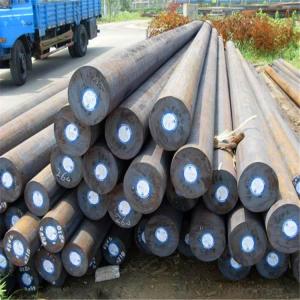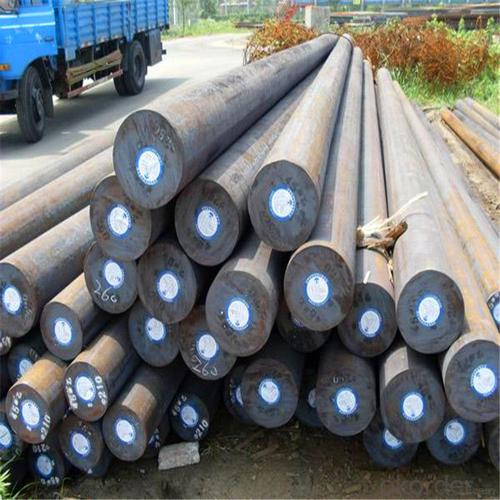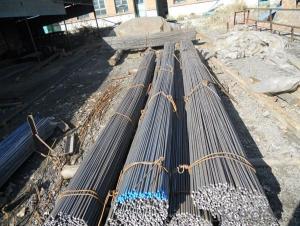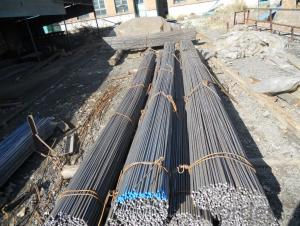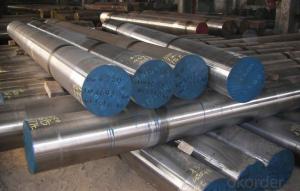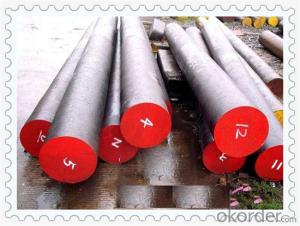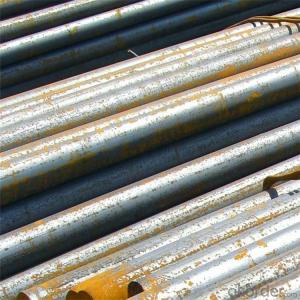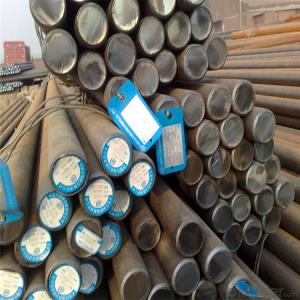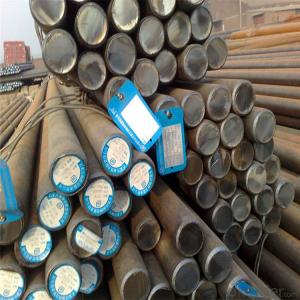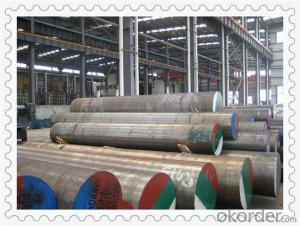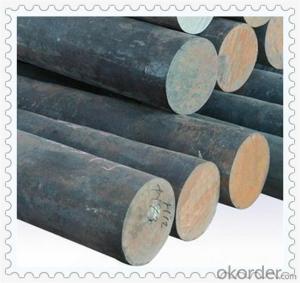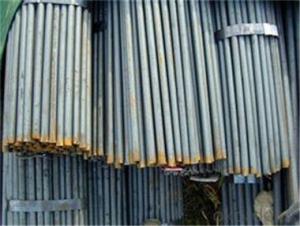S45C C45 SAE1045 Grade Steel Round Bar for Machine Structural Use
- Loading Port:
- Tianjin
- Payment Terms:
- TT OR LC
- Min Order Qty:
- 100 m.t.
- Supply Capability:
- 50000 m.t./month
OKorder Service Pledge
OKorder Financial Service
You Might Also Like
Specification
S45C C45 SAE1045 Grade Steel Round Bar for Machine Structural Use
Product Description of S45C C45 SAE1045 Grade Steel Round Bar for Machine Structural Use
1. Steel grade: SAE1045, 45#, C45, S45C
2. Length: 6M-12M
3. Diameter: 16mm-300mm
4. Product range: round bar, flat bar, square bar
5. Technique: Hot rolled, forged, cold drawn
Specification of S45C C45 SAE1045 Grade Steel Round Bar for Machine Structural Use
Material | S45C | Round bar | Dia(mm) | 16-300mm |
Process | EAF + LF + VD + Forged + Heat Treatment (optional) | Length (mm) | Max 12m | |
Heat treatment | Normalized / Annealed / Quenched / tempered | Flat bar | Thickness(mm) | 8-500mm |
Delivery condition | Hot forged +Rough machined (black surface after Q/T)+ Turned (optional) | Width(mm) | 70-200mm | |
Test | Ultrasonic test according to SEP 1921-84 D/d | Length (mm) | Max 12m |
Chemical Composition of S45C C45 SAE1045 Grade Steel Round Bar for Machine Structural Use
C | Si | Mn | Cr | Ni | Cu |
0.42~0.47 | 0.17~0.37 | 0.35~0.65 | ≤0.25 | ≤0.30 | ≤0.25 |
Photo Show of S45C C45 SAE1045 Grade Steel Round Bar for Machine Structural Use
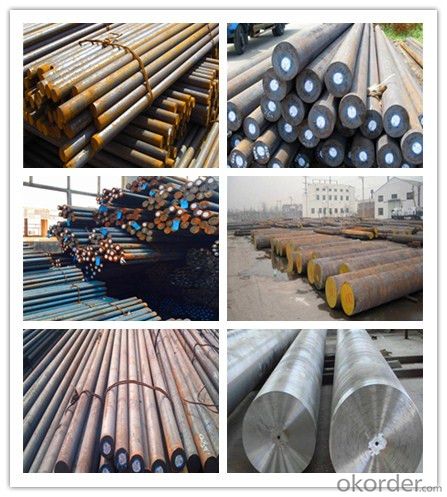
Packing and Delivery:
Packing in bundle package, or as customer's requirements.
Delivery Detail: 45 days after receiving the deposit.
Usage and Applications of S45C C45 SAE1045 Grade Steel Round Bar for Machine Structural Use
1. Steel round bar is used in a large number of architectural and engineering structures. Or it can be used in construction of plants for the production of steel house frames, high-voltage transmission towers, bridges, vehicles, boilers, containers, ships, etc.
2. And we can use this kind of product on the performance of the mechanical parts if the demand is not very high.
3. Some special material steel round bar can be used for main shaft of steamer, hummer shank, with big section and supper force.
Company Information
CNBM International Corporation is the most important trading platform of CNBM group.
Whith its advantages, CNBM International are mainly concentrate on Cement, Glass, Iron and Steel, Ceramics industries and devotes herself for supplying high qulity series of refractories as well as technical consultancies and logistics solutions.


F A Q
1, Your advantages?
professional products inquiry, products knowledge train (for agents), smooth goods delivery, excellent customer solution proposale
2, Test & Certificate?
SGS test is available, customer inspection before shipping is welcome, third party inspection is no problem
3, Factory or Trading Company?
CNBM is a trading company but we have so many protocol factories and CNBM works as a trading department of these factories. Also CNBM is the holding company of many factories.
4, Payment Terms?
30% TT as deposit and 70% before delivery.
Irrevocable L/C at sight.
5, Trading Terms?
EXW, FOB, CIF, FFR, CNF
6, After-sale Service?
CNBM provides the services and support you need for every step of our cooperation. We're the business partner you can trust.
For any problem, please kindly contact us at any your convenient time.
We'll reply you in our first priority within 24 hours.
- Q: Are steel round bars corrosion-resistant?
- Yes, steel round bars can be corrosion-resistant depending on the type of steel used and any additional protective coatings or treatments applied.
- Q: What are the typical tolerances for steel round bars?
- The typical tolerances for steel round bars can vary depending on the specific grade and size of the bar. However, common industry standards typically specify tolerances in terms of diameter deviation, straightness, and length. For diameter, tolerances can range from +/- 0.005 to +/- 0.25 inches, again depending on the bar size. Straightness tolerances are often specified as a maximum deviation per foot or meter, such as 0.010 inches per foot. Length tolerances can range from +/- 0.125 to +/- 1 inch. It's important to consult the appropriate industry standards or supplier specifications for precise tolerances based on the specific requirements of the project or application.
- Q: What is the carbon content in steel round bars?
- The carbon content in steel round bars varies depending on the grade and type of steel being used. Generally, carbon steel round bars contain carbon in the range of 0.08% to 1.5%. Higher carbon content provides increased strength and hardness, but it also decreases weldability and ductility. The specific carbon content in steel round bars is determined during the manufacturing process and can be specified by the customer based on their desired mechanical properties and application requirements.
- Q: What are the different types of steel round bar alloys used in the aerospace industry?
- In the aerospace industry, various steel round bar alloys are commonly used to meet the specific demands of different applications. These alloys have been specifically designed to meet the rigorous requirements of the aerospace sector, including the need for high strength, corrosion resistance, and lightweight properties. 1. Stainless Steel: Among the alloys used in aerospace applications, stainless steel stands out as one of the most popular choices. It possesses excellent corrosion resistance, high strength, and good heat resistance. Aircraft components like landing gear, fasteners, and engine parts often employ this alloy. 2. Titanium Alloy: Due to its exceptional strength-to-weight ratio, titanium alloys find widespread use in the aerospace industry. They offer excellent corrosion resistance, good fatigue strength, and can withstand high temperatures. Aircraft frames, engine components, and landing gear often utilize titanium alloys. 3. Aluminum Alloy: Aerospace applications benefit from the lightweight nature and excellent mechanical properties of aluminum alloys. These alloys possess good corrosion resistance and are commonly used in aircraft structures, wings, and fuselage components. 4. Nickel Alloy: Known for their high strength and exceptional resistance to extreme temperatures, nickel alloys are frequently employed in aerospace applications. They are critical in environments requiring resistance to heat, wear, and corrosion, such as turbine engines and exhaust systems. 5. High-Strength Low-Alloy (HSLA) Steel: HSLA steels are renowned for their high strength and weldability. They offer good toughness and impact resistance, making them ideal for aerospace applications where durability and strength are essential, such as in landing gear and structural components. In summary, the aerospace industry employs a combination of these steel round bar alloys to cater to the specific requirements of different components and applications. Each alloy possesses unique properties that render it suitable for specific aerospace applications, ensuring the safety, reliability, and performance of aircraft in the demanding aerospace environment.
- Q: How do you calculate the deflection of a steel round bar?
- To calculate the deflection of a steel round bar, you need to consider various factors such as the bar's length, diameter, and the applied load. The deflection of a bar refers to the amount it bends or flexes under a specific load. The deflection can be determined using the formula for beam deflection, which is derived from Euler-Bernoulli beam theory. The formula is as follows: δ = (F * L^3) / (48 * E * I) Where: - δ represents deflection - F is the applied load - L is the length of the bar - E is the modulus of elasticity of the steel material - I is the moment of inertia of the round bar To calculate the moment of inertia (I) for a round bar, you can use the formula: I = (π * D^4) / 64 Where: - I is the moment of inertia - D is the diameter of the round bar By substituting the values into the formula, you can calculate the deflection of the steel round bar under the given load. It is important to note that these calculations assume the bar is perfectly elastic and obeys the principles of linear elasticity.
- Q: Can steel round bars be used for making drill bits?
- Steel round bars cannot be utilized in the production of drill bits. Drill bits necessitate distinct materials and manufacturing techniques to guarantee their endurance and efficacy. Typically, drill bits are crafted from high-speed steel (HSS), cobalt steel, or carbide. These materials are selected for their hardness, heat resistance, and ability to endure the substantial forces and temperatures generated while drilling. Conversely, steel round bars are not purposely designed or manufactured to meet the requirements of drill bits. Implementing steel round bars in the production of drill bits would result in substandard performance, heightened abrasion, and potential fracture during drilling activities. It is imperative to employ drill bits that are specifically designed and manufactured for this purpose to ensure efficient and secure drilling operations.
- Q: Can steel round bars be used in the transportation industry?
- Steel round bars are indeed applicable to the transportation industry due to their strength and durability. They possess qualities that make them well-suited for transportation applications, where safety, reliability, and load-bearing capacity are crucial. In this sector, steel round bars serve various purposes, including the construction of vehicle frameworks, the production of axles, drive shafts, suspension components, and other critical parts. The exceptional tensile strength of steel ensures that these components can endure heavy loads and vibrations, making them appropriate for use in trucks, buses, cars, trains, and other modes of transportation. Furthermore, steel round bars can be easily machined and fabricated into different shapes, enabling customization and adaptation to specific transportation requirements.
- Q: Can steel round bars be used in the production of bearings?
- No, steel round bars are not typically used in the production of bearings. Bearings are usually made from specialized materials such as stainless steel, bearing steel, or other alloys specifically designed for their load-bearing properties and ability to reduce friction.
- Q: Can steel round bars be used in the food processing industry?
- Yes, steel round bars can be used in the food processing industry. Steel is a common material used in various industries due to its strength, durability, and resistance to corrosion. In the food processing industry, steel round bars are often used for equipment such as food mixers, conveyors, and cutting tools. These bars are typically made from stainless steel, which is a specific type of steel that contains chromium and other elements to enhance its resistance to corrosion and staining. Stainless steel is non-reactive and does not impart any flavors or odors to the food being processed. Furthermore, it is easy to clean and maintain, making it suitable for use in food processing facilities where hygiene is of utmost importance. However, it is important to ensure that the steel round bars used in the food processing industry meet the necessary standards and regulations to ensure the safety of the food being processed.
- Q: Can steel round bars be coated for added protection?
- Steel round bars can indeed be coated to provide additional protection. Coating these bars is effective in boosting their resistance to corrosion, wear and tear, as well as other environmental factors that may cause deterioration or damage. There are multiple coating options available for steel round bars, including hot-dip galvanizing, epoxy coating, powder coating, and zinc plating. These coatings create a protective layer that acts as a barrier between the steel and its surroundings, thus preventing direct contact with corrosive substances or abrasive elements. By coating steel round bars, not only does their lifespan and durability increase, but their aesthetic appearance also improves. The choice of coating depends on the specific application, environment, and desired level of protection.
Send your message to us
S45C C45 SAE1045 Grade Steel Round Bar for Machine Structural Use
- Loading Port:
- Tianjin
- Payment Terms:
- TT OR LC
- Min Order Qty:
- 100 m.t.
- Supply Capability:
- 50000 m.t./month
OKorder Service Pledge
OKorder Financial Service
Similar products
Hot products
Hot Searches
Related keywords
